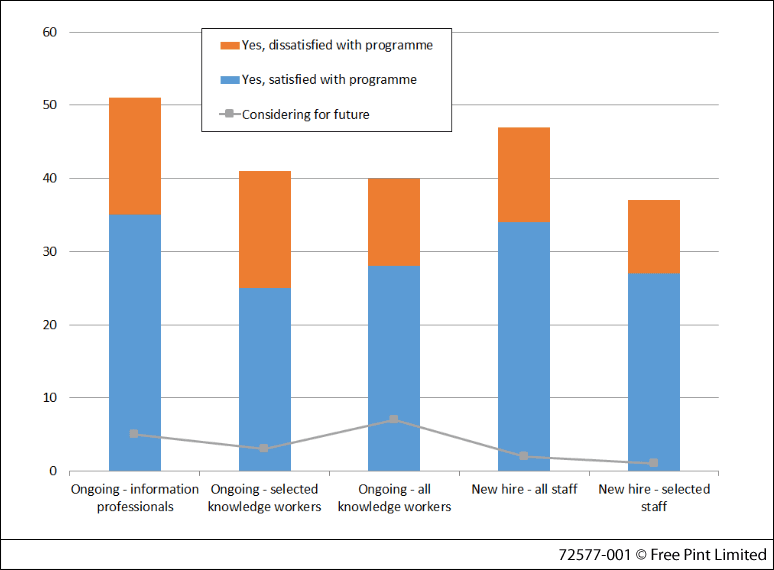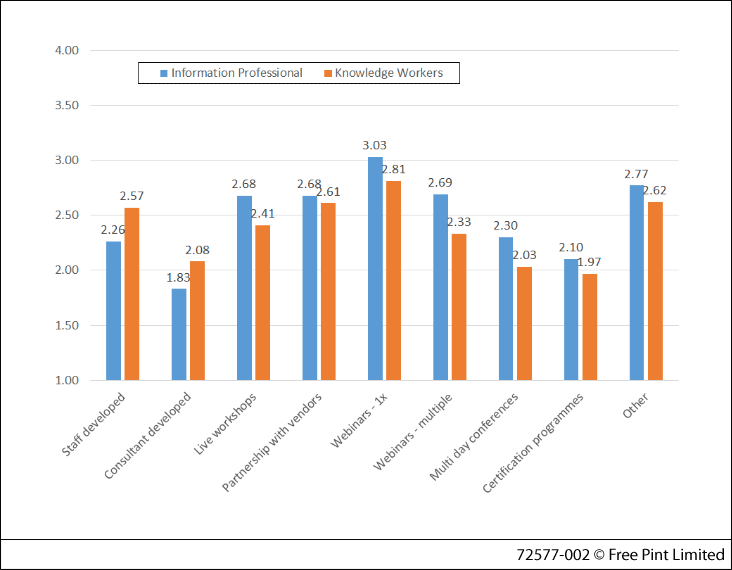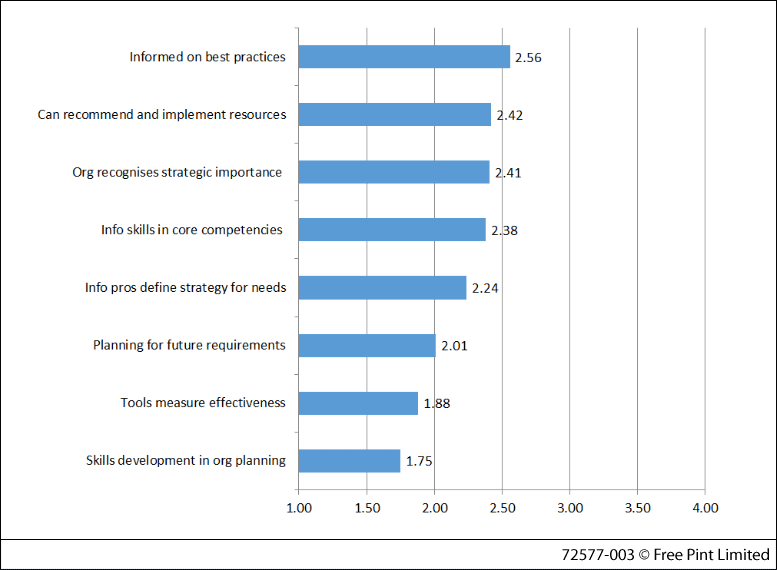 Initial View on Information Skills Development Survey
Initial View on Information Skills Development Survey
Jinfo Blog
11th May 2015
Abstract
The initial results of FreePint's research into information skills development suggest that we have a long way to go in raising awareness amongst corporate leadership around the urgent need for a trained and information-savvy workforce. FreePint's director of research, Robin Neidorf sheds light on the findings to date. And there's still time to complete our short survey and receive a copy of the results on publication.
Item
 As part of the current Topic Series, "Best Practices in Information Skills Development", we are undertaking a survey to understand organisational strategies around equipping workers for current and future responsibilities.
As part of the current Topic Series, "Best Practices in Information Skills Development", we are undertaking a survey to understand organisational strategies around equipping workers for current and future responsibilities.
To date, over 80 participants have completed the survey, and the results suggest that we have a long way to go in raising awareness amongst corporate leadership around the urgent need for a trained and information-savvy workforce.
As with the Topic Series itself, the survey looks at the full pool of knowledge workers, as well as the needs of information professionals. We take this approach because the clear trend in organisations of all kinds is for knowledge workers to be increasingly self-sufficient; they need to interact effectively with information tools.
At the same time, the role of information professionals is also shifting, and the skills currently being developed may not address the future organisational needs.
What Programmes Exist?
We ask respondents if their organisations offer different types of development programmes, and if they are generally satisfied with those offerings. The responses to date are shown in Figure 1.
Figure 1: Does your organisation engage in any of the following professional development for information skills?
A reasonable portion of respondents to date report that their organisations offer ongoing training for information professionals, though nearly a quarter of those are dissatisfied with what's on offer.
Only half of respondents report that their organisations offer ongoing information skills development for selected knowledge workers.
Nearly 50 of the 80+ respondents report that all new hires have some information skills orientation or training.
We ask respondents how likely their organisations are to provide different types of development for information professionals and/or knowledge workers:
- Bespoke sessions - staff developed
- Bespoke sessions - consultant developed
- Live workshops or conferences - one day or less
- Sessions developed in partnership with product vendors
- Webinars - single session
- Webinars - multiple sessions/series on the same topic
- Multi-day conferences/workshops
- Certification programmes
- Other.
Each of these types can be rated on a scale of 1 to 4, where 1 = not likely and 4 = very likely. The average ratings are shown in Figure 2.
Figure 2: "How likely is your organisation to undertake any of the following approaches to delivering information skills training to information professionals or knowledge workers?"
Based on average ratings to date, the most likely type of offering for both information professionals and knowledge workers is a single-session webinar. Relatively unlikely choices include consultant-developed sessions, multi-day conferences and certification programmes.
Defining Organisational Strategy
The survey asks respondents to rate their agreement with a series of statements reflecting the state of their organisation's overall strategy around information skills development. These statements include:
- We have a clear strategy for planning for the future of required information skills
- Information professionals are appropriately involved with defining the strategy for current and future needs
- Senior leaders understand the importance of keeping everyone's information skills up to date
- We have the right resources to stay informed about best practices in information work
- Our training/human resources department incorporates information skills development in its planning
- We have tools to measure the effectiveness of development initiatives
- Information skills are explicitly part of defined core competencies for knowledge workers
- When information professionals have a recommendation regarding skills development, they have a clear pathway to approval and implementation.
Each can be rated on the 1-to-4 scale.
Figure 3 shows average ratings to date for these statements. The highest-rated item - "We have the right resources to stay informed about best practices in information work" - only earns a 2.56 rating on the 4-point scale, just barely into the upper half of the rating scale.
Figure 3: Agreement with statements about information skills development in respondents' organisations
Respondents are particularly unlikely to agree that information skills are recognised as part of organisational planning; they have tools to measure the effectiveness of initiatives; and their organisations are planning effectively for future needs.
Given how rapidly our industry changes, and how much these changes affect every knowledge worker's ability to make decisions, be innovative and contribute to organisational value, these initial results suggest that the current gap between what information professionals know is important and what decision-makers understand is under threat of increasing.
Participate in the Survey
There's still time to participate. Take 10 minutes to complete the survey. Your responses are fully anonymous, but if you provide an email address at the end of the survey, we will provide you with a copy of the final report in June 2015.
This Blog Item is part of the FreePint Topic Series "Best Practices in Information Skills Development".
- Blog post title: Initial View on Information Skills Development Survey
- Link to this page
- View printable version
- Create Engaging and Memorable Presentations by Going Beyond PowerPoint
Thursday, 7th May 2015 - Slow Motion Train Crashes and How to Avoid Them - Tips for Terrified Trainers
Thursday, 23rd April 2015 - Bite-Size Training - Making a Difference with Short, Face-to-Face Sessions
Thursday, 9th April 2015 - Preventing Knowledge Loss When Employees Leave
Tuesday, 3rd February 2015 - Useful Consultancy Skills for Information Professionals
Thursday, 17th July 2014
- Strategies for Developing and Conducting Training
Wednesday, 6th May 2015 - Launching FreePint's Survey on Skills Development Strategy
Tuesday, 21st April 2015 - Introducing the FreePint Topic Series "Best Practices in Information Skills Development"
Friday, 20th March 2015
Register for our next Community session:

Team roles and AI
26th February 2026
Latest on our YouTube channel:
Read on the Blog:
January 2026 update
7th January 2026
- How BASF puts knowledge at the centre of innovation
28th January 2026 - All recent Subscription content
22nd January 2026 - Should you sign up for a product in beta?
13th January 2026
- Licensed content and AI (Community) 24th March 2026
- BASF's knowledge platform demo (Community) 10th March 2026
- Team roles and AI (Community) 26th February 2026


